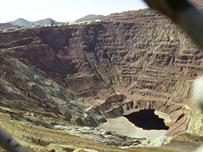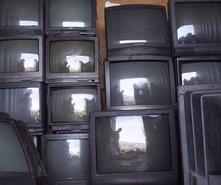For students, researchers, reporters, policy wonks, interns, savants, recycling gurus...
During 10 years between my departure from Massachusetts DEP and the final snuffing out of analog TV broadcasts this year, a lot of research, press, and approaches to the "E-Waste" or "E-Scrap" or "Surplus electronics" issue. We like to broadcast what we learn, usually via our blog.
We support Fair Trade development of reuse and repair jobs overseas, brakes on federal raw material (mining) subsidies, job creation, and a bridge across the digital divide. We are promoting higher recycling standards, keeping toxics out of New England landfills and incinerators, and promoting women's rights in developing countries.
When you pay $5-20 to recycle a small appliance or huge TV, you are doing more than getting half-the-price charged in California, Minnesota, Maine or other states (which pass the fees to consumers in different ways). You are not only supporting a sustainable recycling economy in the Northeast.
|
 |
| Bisbee Copper Queen Mine |
|
| Mining Reform: Good Point has been on the front lines of bringing the message of raw materials subsidies to the recycling advocacy groups (currently distracted by Product Stewardship). The General Mining Act of 1872 is up for evaluation by Congress, the first time in 137 Years! If the subsidies for the virgin material are phased down, investments in recycled material will increase dramatically. Hard rock metal mining creates 45% of all toxics released by all industry! And in China, the mining and smelting pollution is far worse than recycling pollution. See articles about several virgin ore smelter spills which poisoned entire city water supplies.
|
|
| Recycled Gold Certification: Good Point is pursuing an "recycled from circuit boards" gold content standard, to promote more recycling, and to take more circuit boards out of loads going to places like China and India. Those two countries have the highest gold demand per capita (!) because of poor womens rights standards (women cannot inherit land, so if you love your daughter, you give her gold), which drives really nasty and toxic aqua regia recycling practices. Article about our recycled gold summit in Arkansas in 2006.
|
|
| Fair Trade Export Standards: Revenues from Good Point Recycling provide major support to WR3A (World Reuse, Repair and Recycling Association). WR3A is a Fair Trade Recycling Association which is pursuing ethical export standards. We don't want developing countries to turn to mining for raw materials (which they use to make "stuff" for us). Follow the links to film on Youtube, sponsored by a grant from Consumer Electronics Association in 2008.
|
|
| World Internet Access: The developing world is starving for internet access. They will get it any way they can. They cannot afford new computers, yet a study by WR3A shows that internet access is increasing 10x the rate of the USA in countries with less than 1/10 of the USA's GDP per capita. Our approach is that donating computers directly to poor schools is admirable, but that selling newer PCs to refurbishers in those countries can achieve the same goals. Good Point Recycling gave a tour to a group representing the UNGAID to show how the UN could increase comfort with proper exports, resulting in more computers being exported through WR3A, and that this could be leveraged to get professional refurbishers in the home countries to set up those schools. Good Point attended a joint program with WR3A and UNGAID at the 2009 CES Show.
|
 |
| TVs coming out of woodwork 2004 |
|
| Universal Access to E-Waste Recycling Opportunities: While other groups and states quarrelled at national meetings, or demanded grants and one-time events, Good Point Recycling worked steadily. We realized that other "difficult to manage" wastes - tires, refrigerators, auto batteries, air conditioner, etc. - are all recovered at rates of 85% across the country, from New York City to central Oklahoma. The difference between TV and PC recovery rates (15%) and the 85% rate of these other items could only be explained one way: there were fee collections set up for the other items. Rather than pursue complex 'command and control' solutions, we set up recycling collections everyplace in Vermont that collected white goods. Today 83% of Vermonters can recycle a TV (not just PCs) at at least one location, five days per week. The tonnage collected in Vermont per capita during the last 5 years (est. 17.7 lbs per resident) puts us in the top 5 states in the USA, without a large commercial office base or even a waste ban.
|
|